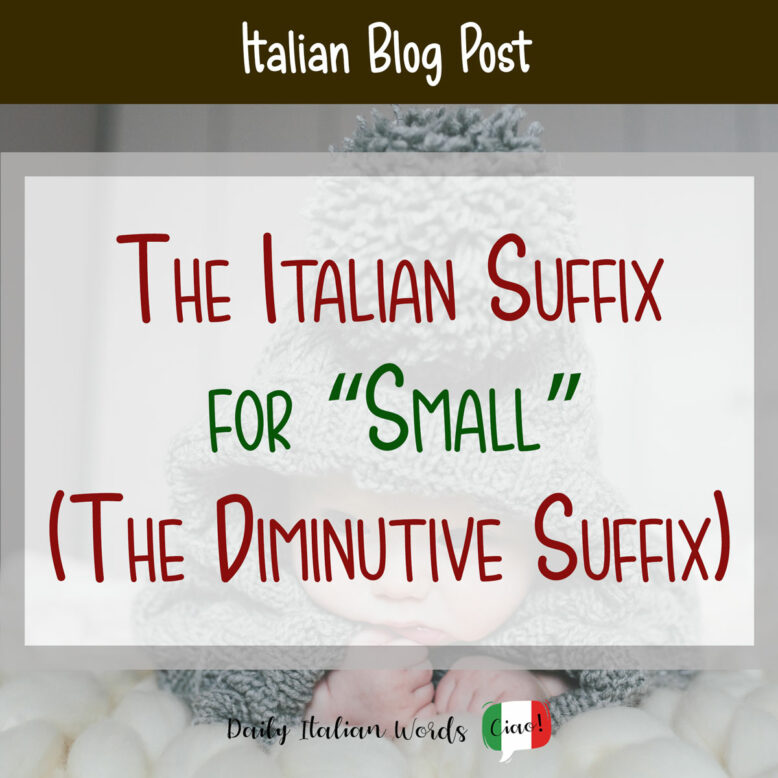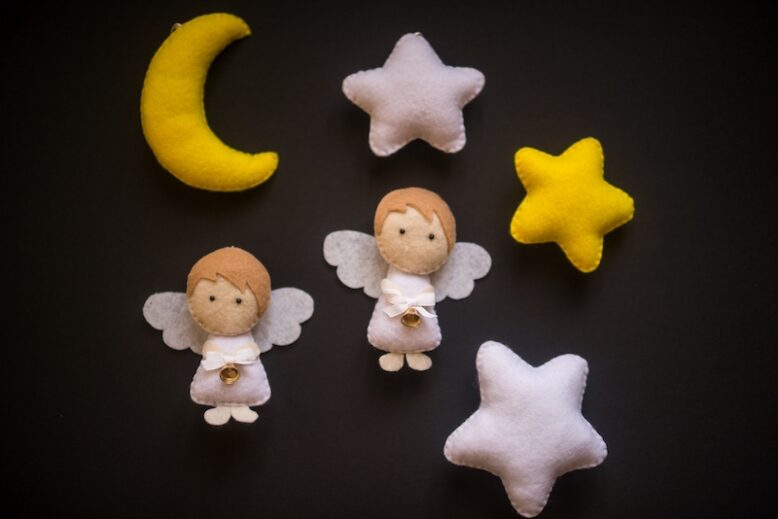Diminutives are a suffix (a part of speech we add at the end of a root word to alter its meaning) that imply smallness or a sense of endearment. We have a few in the English language. Most commonly, to imply that something is small or young, we can add a –y or –ie. For example, if a dog is small, we might call it a “doggie”. Or, a young child might call her mother “mommy” to add sweet affection. A few more common diminutives in English are –ette or –let (as in kitchenette or piglet), or –ling (as in duckling).
The Italian language has diminutives as well. These diminutives can imply smallness, youth, or endearment. Let’s talk about the two most common diminutives in Italian: –ino and –etto.

Adding Diminutives
The suffixes –ino and –etto can be added to most nouns quite easily, with a few exceptions (More to come on that later). Simply chop off the final vowel and replace it with the suffix. Take, for example, the nouns naso (nose) and casa (house):
naso → nas_→ nasino
Nasino might be used while cooing over a baby’s little button nose.
casa → cas_→ casetta
Casetta might be used to describe your little cabin home in the woods.
Both versions of the diminutive should be altered to match the noun’s gender and number. For example, a feminine noun would be altered by –ina, not –ino, and plural nouns should be altered with –etti / –ette, not –etto.
| Singular masculine | -ino | -etto |
| Singular feminine | -ina | -etta |
| Plural masculine | -ini | -etti |
| Plural feminine | -ine | -ette |
Try adding a diminutive to the plural nouns paesi (villages, from singular paese) and sacchi (sacks or bags, from singular sacco):
paesi → paes_→ paesini
Paesini can be used to describe the many small villages in the hills of Tuscany.
sacchi → sacch_→ sacchetti
(notice the added “h” in order to maintain the hard /c/ sound when the “e” of –etto was attached)
Sacchetti may be used when asking for a few plastic bags to help you carry home your groceries.
Be Careful
–ino and –etto can sometimes be interchangeable, but not always. For example, you can say fratellino (little brother) but not fratelletto, and you can say cuginetto (little cousin) but not cuginino. What’s more, some nouns, when you add one of the suffixes, would become equivalent to another root word that already exists. For that reason, you cannot add the suffix –ino to tacco (heel) when talking about your favorite little kitten-heel shoes, because then you would be talking about turkey (tacchino) instead!
Unfortunately, there isn’t a single rule that dictates when to use –ino versus –etto, so it’s a matter of learning where they apply on a case-by-case basis.

Other Uses (Besides “Small”)
Besides “small”, the diminutives –ino and –etto can also imply youth or endearment. In this way, we can add –ina to the word sorella (sister) to denote that she is the younger sibling.
sorella → sorell_→ sorellina
Or, you can add more affection while cooing over your sweet four-legged friend. Cucciolo, meaning a baby animal or cub, is a common term of endearment. To add even more affection, add the diminutive –ino.
cucciolo → cucciol_→ cucciolino
Proper names can also be modified with suffixes as a nickname or term of endearment. In this case, sweet little Giuseppe down the road might be lovingly called Giuseppino. A great example of this that all Italian children will know comes from our fictional friend Mickey Mouse, whom Italians know as “Little Mouse” or Topolino. Here, the word mouse (topo) is modified with a variant of –ino (-olino).
Remembering gender-and number-agreement rules, can you guess which of Mickey’s pals is called Topolina?
Can you use it in a sentence?
Let’s see if we can properly translate this sentence.
There is a little star in the sky.
You could translate this sentence in the following manner:
C’è una piccola stella nel cielo.
However, it would sound just as natural to use the diminutive to imply the star’s cuteness (and smaller size).
C’è una stellina nel cielo.

The Everyday Impacts of Diminutives
Suffixes are commonly used in the Italian language. There are tons of suffixes implying different attributes, like largeness, unpleasantness, endearment, or pity. The commonplace usage of suffixes and diminutives have made subconscious changes to the Italian language. Some nouns with an added suffix are so commonplace that they have taken on a definition of their own:
Bacio (kiss) and bacetto (quick peck on the cheek, as is a common greeting)
Parola (word) and parolaccia (curse word) – this example uses a different suffix that implies ugliness or nastiness
Maglia (sweater) and maglietta (T-shirt)
Finestra (window) and finestrino (window of a vehicle)
Other Diminutives that Mean “Small”
–ino and –etto are two of the most common Italian suffixes that mean “small” but there are some others worth familiarising yourself with:
- –ello / –ella > e.g. albero “tree” becomes alberello “sapling”
- –otto / –otta > e.g. orso “bear” becomes orsacchiotto “teddy bear”
- –(u)olo / –(u)ola > e.g. faccenda “matter” becomes faccenduola “small chore”
- –icci(u)olo / –icci(u)ola > e.g. festa “party” becomes festicciola “small intimate party” – denotes smallness and often insignificance
- –iciattolo / –iciattola > e.g. mostro “monster” becomes mostriciattolo “little monster” – has a negative connotation
Diminutive suffixes are a major part of the Italian language. Especially if you find yourself around children or parents of young children, you will hear these –ino and –etto endings quite frequently! Using suffixes is a habit that takes some time to form. Try to take notice when you read or hear these modified words, and then make it a point to use that same modified word later on your own.
Heather Broster is a graduate with honours in linguistics from the University of Western Ontario. She is an aspiring polyglot, proficient in English and Italian, as well as Japanese, Welsh, and French to varying degrees of fluency. Originally from Toronto, Heather has resided in various countries, notably Italy for a period of six years. Her primary focus lies in the fields of language acquisition, education, and bilingual instruction.


